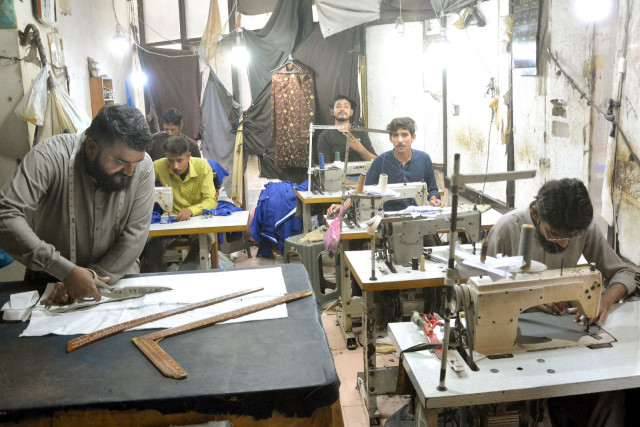Tailors are having roaring business ahead of Eid
Karachi's menswear fashion scene reflects a fusion of regional styles

The bustling metropolitan city, known for its vibrant cultural tapestry, comes alive during Ramazan as tailoring shops buzz with activity to cater to the diverse sartorial preferences of its residents. As Eidul Fitr approaches, the city's menswear fashion scene reflects a fusion of regional styles, showcasing the rich cultural amalgamation within its communities.
One striking example is the popularity of Balochi shalwar-qameez, known for their baggy trousers, round-hemmed kameez, and dropped shoulders. Tailors in Lyari specialise in crafting these garments, favoured for their comfort in Karachi's sweltering heat. Interestingly, individuals from various linguistic backgrounds also embrace the Balochi style, exemplifying the city's spirit of cultural exchange.
Similarly, the Pashtun community in Karachi favours fitted shirts, reflecting their robust physique, a style admired by youth from diverse backgrounds. Sindh's traditional ghairdar shalwars and tight shirts, along with round-necked shirts worn by Hazara and Quetta Pashtuns, add to the city's sartorial diversity, drawing attention for their uniqueness.
While the pajama, originally a South Asian garment, has made a resurgence in recent years, with people from various communities opting for straight pajamas paired with tight kurtas, reflecting evolving fashion trends.
During Ramazan nights, youth from different communities traverse the city, visiting each other's neighbourhoods to experience the vibrant cultural hues and indulge in the festivities. Motorcycle groups journey from Nazimabad to Lyari and from Gulshan to Banaras, embracing the city's colourful tapestry.
The trend in menswear sees a preference for light embroidery on kurtas and shirts, with additional charges based on design intricacy. Double stripes and brightly colored fabrics on sleeves and collars are also popular choices for embellishment.
In response to the scorching heat, lightweight cotton and lawn fabrics dominate men's clothing this season. While sewing cotton suits incurs higher charges compared to wash-and-wear garments, the latter remains a preferred choice for many due to its convenience.
Booking orders for Eid attire typically commences in Shaban, with reputed tailors ceasing to accept new orders after the first week of Ramazan. Despite increased tailoring wages this year, established tailors prioritise existing customers, citing their busy schedules.
To meet the surge in demand during Eid, temporary tailoring shops spring up across the city, attracting tailors from Sindh and Punjab seeking to make some extra bucks. However, the quality of stitching in these seasonal shops often varies, with regular tailors preferred for personalised service.
Apart from neighbourhood tailoring shops, large tailoring factories in central markets like Karim Center and Cooperative Market play a crucial role in meeting the Eid demand. These factories operate round the clock during Ramazan, with artisans from outside Karachi accommodating in nearby facilities.
The rise in tailoring wages is attributed to increased demand and the daily wages of artisans, which hover around Rs2,000 this year. Specialisation within the tailoring industry ensures efficiency, with different artisans handling cutting, stitching, embroidery, and other tasks.
As Eid draws near, the city's tailoring industry buzzes with activity, embodying the collaborative spirit of Karachi's diverse communities as they come together to celebrate the joyous occasion.
Published in The Express Tribune, April 6th, 2024.



















COMMENTS
Comments are moderated and generally will be posted if they are on-topic and not abusive.
For more information, please see our Comments FAQ